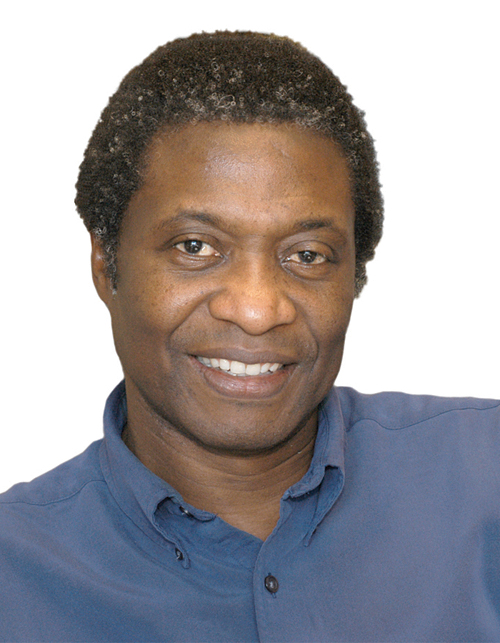Ntambi honored for unique contributions to education
, professor of biochemistry and of nutritional sciences at the University of Wisconsin-Madison, is the winner of the ÉỲÀïṖỲ .

“It is an immense honor for me to accept this award and to be held in the highest regard as a scientist and teacher. I continue to believe that we should put into practice what we teach and learn both in and out of the classroom — an experience that brings new meaning to the education of all humans.”
Ntambi, a native of Uganda, received his bachelor’s and master’s degrees from Makerere University Kampala and then his Ph.D. from John Hopkins University in 1985. After a postdoctoral fellowship at Hopkins and after working briefly at Georgetown University, he joined the departments of biochemistry and nutritional sciences at the University of Wisconsin-Madison, where he has taught and conducted research for 20 years.
In addition to teaching the metabolism section of the large undergraduate course in general biochemistry, Ntambi teaches a unique Uganda study abroad course called International Health and Nutrition. “The central concept of this course is that UW-Madison undergraduates apply the biochemistry they learn in the classroom to real-world problems,” Ntmabi explained.
Ntambi and his colleagues first discuss with the students the biochemical basis of nutrition, as well as agriculture, culture, economics, education and public health issues particular to Uganda. This is followed by a three-week trip to Uganda, where they work in villages and see nutritional, environmental and public-health problems firsthand. They visit rural health centers, HIV/AIDS clinics, child-nutrition centers, agricultural research stations, local markets and rural schools to learn about real-life experiences in the communities.
Through Ntambi’s collaboration, there has been exchange in the other direction as well: Makerere University faculty members and students have visited Madison, and some have conducted research in Ntambi’s lab. These education and research experiences have helped students and faculty members of the two institutions build international networks and discuss global public-health issues, Ntambi said.
“James’ Uganda program has been a tremendous success, with valuable consequences for UW students long after their Ugandan experience,” said Ormond MacDougald, director of graduate studies at UWM, in his nomination of Ntambi. “By exposing students to critical health issues, students are provided with opportunities to learn more about themselves as future health care professionals.”
Meanwhile, Ntambi’s research program in Madison focuses on the biological roles of stearoyl CoA desaturase enzymes. Ntambi’s pioneering work on the genetic regulation of SCD has led to many new insights into the importance of these enzymes in metabolism and in disease states such as obesity, diabetes, atherosclerosis, inflammation and cancer.
The Ntambi research program has trained 16 Ph.D. students, 15 postdoctoral fellows, more than 30 undergraduate students and several high-school students.
Lacmbouh Ghislain Ade, one of Ntambi’s former interns, stated in his nomination letter, “After working with Dr. Ntambi only a couple of days, I still can remember walking into his office and asking him, ‘Sir, how can I become like you?’ Dr. Ntambi is all you expect of a mentor, and his motivation and dedication to seeing his students succeed is really phenomenal.”
Ntambi will receive his award during the Experimental Biology 2013 conference in Boston, where he will deliver an award lecture. The presentation will take place at 12:30 p.m. April 21 in the Boston Convention and Exhibition Center.
Enjoy reading ASBMB Today?
Become a member to receive the print edition four times a year and the digital edition monthly.
Learn moreGet the latest from ASBMB Today
Enter your email address, and weâll send you a weekly email with recent articles, interviews and more.
Latest in People
People highlights or most popular articles

Hidden strengths of an autistic scientist
Navigating the world of scientific research as an autistic scientist comes with unique challenges âmicroaggressions, communication hurdles and the constant pressure to conform to social norms, postbaccalaureate student Taylor Stolberg writes.

Richard Silverman to speak at ASBMB 2025
Richard Silverman and Melissa Moore are the featured speakers at the ASBMB annual meeting to be held April 12-15 in Chicago.

Womenâs History Month: Educating and inspiring generations
Through early classroom experiences, undergraduate education and advanced research training, women leaders are shaping a more inclusive and supportive scientific community.

ASBMB honors Lawrence Tabak with public service award
He will deliver prerecorded remarks at the 2025 ASBMB Annual Meeting in Chicago.

ASBMB names 2025 JBC/Tabor Award winners
The six awardees are first authors of outstanding papers published in 2024 in the Journal of Biological Chemistry.

Daniel N. Hebert (1962â2024)
Daniel Hebertâs colleagues remember the passionate glycobiologistscientist, caring mentor and kind friend.

